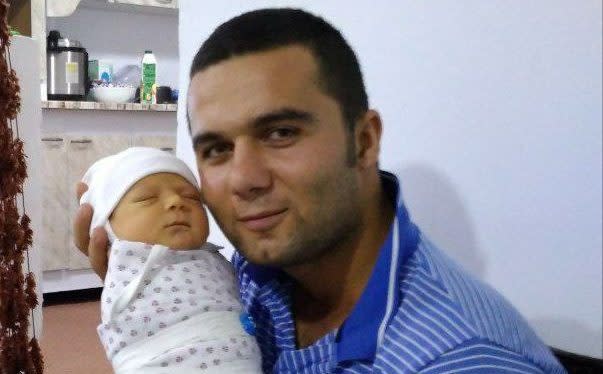Iran executed dissident on charges of spying for Israel after five-minute trial

It took just five minutes for an Iranian court to consider the case against Pejman Fatehi before sentencing him to death on charges of spying for Israel.
In late January, Mr Fatehi and three associates were hanged in Iran’s largest prison, Ghezelhesar, a towering complex on the road towards the capital Tehran.
“His trial was not fair at all,” Bayan Azimi, Fatehi’s wife, told The Telegraph.
According to Amnesty International, the Iranian regime executed 853 people in 2023, more than twice as many as in 2021. Many of those put to death are political dissidents, said a report released this week by the human rights group.
Gaza war ‘used as cover’
Analysts say Tehran is using the cover of the war in Gaza to step up its campaign to eliminate protesters and other threats to the regime.
Ms Azimi believes the true figures are much higher, but families often avoid speaking out under pressure from the regime.
“They have executed way more than the numbers you see,” she said. “There are many people who have no voice, and the Islamic Republic executes them.”
Diana Eltahawy, the deputy director of Amnesty International in the Middle East and North Africa, said: “Protesters, dissidents and members of oppressed ethnic minorities are among those executed as the authorities have weaponised the death penalty in an orchestrated bid to sow fear among the public and suppress dissent.”
Iranian authorities “intensified their use of the death penalty to instil fear in the population and tighten their grip on power,” following mass protests that swept the country in late 2022, the Amnesty report states.
They have already executed at least nine protesters, following trials widely criticised as unfair and marred by allegations of torture.
Among those executed was Mohammad Ghobadlou, a 23-year-old protester with a mental disability. Despite a Supreme Court order for a retrial, he was put to death in January.
Protests followed hijab arrest death
The 2022 demonstrations began after 22-year-old Mahsa Amini died while in the custody of Iran’s morality police, who arrested her for allegedly failing to wear her headscarf properly.
More than 500 people were killed in the crackdown on the protests that followed, according to human rights sources.
Tehran’s execution surge has been built on a range of extraordinarily loose charges, including “waging war against God” and “corruption on Earth,” terms used to mean anything from affronting Islamic morals to protesting against the regime.
Iran’s revolutionary courts hand down death sentences to prisoners, with judges appointed by Gholam-Hossein Mohseni-Eje’i, the hardline head of judiciary, who was himself directly appointed by Supreme Leader Ali Khamenei. Since his appointment in 2021, the number of executions has surged.
On Tuesday, a group of inmates in Ward 1 of Ghezelhesar prison staged a protest against “arbitrary executions” and violence by prison officers.
“They take 10 to 20 people just from here each week and kill them,” they said.
Mr Fatehi, 28, and the others tried and executed along with him – Mohsen Mazloum, 27, Mohammad Faramarzi, 28, and Wafa Azarbar, 26 – were part of Iran’s Kurdish Sunni minority.
Aside from the espionage allegations, the four men were also accused of trying to “bomb a defence ministry facility” in central Isfahan, where Iran’s main nuclear site is located.
Their families, as well as the lawyer representing them, strenuously denied the allegations.
‘Grossly unfair’ secret trial
The four men were first arrested in July 2022, and largely held incommunicado, before being subjected to their “grossly unfair secret trial” in January of this year, Amnesty said.
Masoud Shamsnejad, the lawyer who represented the group, said: “My representation was only on paper and ultimately ineffective. I do not consider the trial process or the final death sentences to be fair or just.”
Ms Azimi believes her husband was targeted because of his links with a Kurdish opposition group, the Komala Party of Iranian Kurdistan, and for his work in supporting Iranian women following the protests in late 2022.
“The Islamic Republic is a repressive regime, and my husband was helping the oppressed,” she said.
Even before Mr Fatehi’s arrest, the threats against the family were serious enough that they decided Ms Azimi would leave Iran with their young son with the help of smugglers.
Wife learned of execution on the news
After a journey including a three-day walk along the Turkish border, the mother and son made it to Germany, where they were granted asylum.
Ms Azimi learned of the execution of her husband, who she met a decade ago, on the news.
In despair, she cut off their son’s hair, which she had promised Mr Fatehi she would let grow until their family could be reunited.
Now, she and Mr Fatehi’s relatives remaining in Iran are campaigning to have his body returned.
Ms Azimi fears that “they tortured him before execution and do not want everyone to see it…. We also fear they might have sold their organs“.
“But they are dictators and will not tell us what happened to his body and the three others,” she added. “We just want to know where his grave is if they buried him.”


